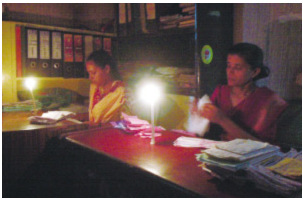
The day the power went off in Delhi and northern India, I was at home in Bangalore, a city that fortunately escaped the blackout. It brought back memories of my student days in Kolkata, a city then (in the 1980s) notorious for its power cuts. Eight or 10 hours without electricity were de rigueur. The fan would stop working at night: at 38C and 90 per cent humidity, this meant no sleep until the power came back. We would gather outside, talking in groups, varying our routine by walking to the highway that ran alongside our campus, where dhabas served tea (and stronger stuff) all night.
德里及印度北部停電的那天,我正在班加羅爾的家里,這座城市幸運(yùn)地未受波及。這讓我想起了我在加爾各答上學(xué)的日子,當(dāng)時(shí)(上世紀(jì)80年代)加爾各答以頻頻停電而臭名遠(yuǎn)揚(yáng)。每天停電8至10小時(shí)是家常便飯。晚上電扇會(huì)停轉(zhuǎn),而氣溫高達(dá)38攝氏度,空氣濕度達(dá)90%,這意味著,來(lái)電之前根本沒(méi)法睡覺(jué)。我們就聚在室外,扎堆兒聊天,或向校園旁的高速公路走去,而不是像通常一樣在原地干等來(lái)電。高速公路邊的Dhaba(印度公路旁邊的餐館——譯者注)通宵供應(yīng)茶水(以及一些更帶勁兒的飲品)。
Even now, many villages have electricity for only four to six hours a day and some still have no power at all. As a student, I awoke when the fan went off. On the other hand, peasants wake themselves up when the lights come back, to use the tubewells that irrigate their fields.
即便到了現(xiàn)在,很多村莊每天也只有4至6個(gè)小時(shí)有電,有些村莊甚至仍不通電。當(dāng)時(shí)作為學(xué)生的我是電扇一停轉(zhuǎn)就醒過(guò)來(lái),而農(nóng)民則是燈一亮就起床,好抓住有電的時(shí)機(jī)使用管井灌溉莊稼。
Indians have long been used to erratic power supply; yet the recent outages were special, spectacular in their scale and impact. Twenty one out of 28 states were without power for long stretches. Some 600m Indians were affected. It is not yet clear what caused the collapse. With the monsoon having failed, it is far hotter and drier than is usual at this time of year, driving the rich to use more air conditioning and peasants to rely more heavily on their tubewells. In the rush to satisfy their citizens, individual states drew more than their share from the National Grid. As The Hindu newspaper reported, Uttar Pradesh, Punjab, Rajasthan, Haryana and Uttarakhand all "ignored strong warnings from the . . . Central Electricity Regulatory Commission to maintain grid discipline and stop over-drawal".
印度人早已習(xí)慣了不穩(wěn)定的電力供應(yīng);但近期的停電比較特殊,其規(guī)模和影響比較驚人。印度的28個(gè)邦中有21個(gè)遭遇長(zhǎng)時(shí)間停電。約6億印度人受到影響。目前尚不清楚大停電的原因。今年的季風(fēng)帶來(lái)的降雨偏少,天氣比往年同期更加炎熱干燥,結(jié)果富人的空調(diào)使用量增加,農(nóng)民也更加依賴管井。個(gè)別邦急于滿足本邦居民的需求,從印度國(guó)家電網(wǎng)(National Grid)汲取了超出其配額的電量。《印度教徒報(bào)》(The Hindu)報(bào)道稱,北方邦、旁遮普邦、拉賈斯坦邦、哈里亞納邦和北阿坎德邦全都"無(wú)視中央電力監(jiān)管委員會(huì)(Central Electricity Regulatory Commission)要求遵守電網(wǎng)紀(jì)律、停止過(guò)度用電的強(qiáng)烈警告"。
Behind this short-term political desperation lies a longer-term institutional decline. Back in the 1990s, the distinguished energy scientist A.K.N. Reddy outlined a strategy to overcome India's energy crisis. This focused on reducing theft and distribution losses (estimated at 30-40 per cent of total consumption), upgrading transmission and end-use technologies and running state electricity boards professionally. The suggestions were disregarded. Antiquated technologies were not replaced. Political interference and corruption continued.
在這種短期的政治層面的喪失信心背后,隱藏著一種較長(zhǎng)期的機(jī)構(gòu)層面的衰敗。上世紀(jì)90年代,杰出的能源科學(xué)家A•K•N•雷迪(A.K.N. Reddy)提出了一項(xiàng)解決印度能源危機(jī)的戰(zhàn)略。這項(xiàng)戰(zhàn)略的重點(diǎn)是減少偷電和配電損失(估計(jì)占電力總消耗量的30%至40%),升級(jí)輸電和終端使用技術(shù),并讓專家來(lái)管理國(guó)家電力委員會(huì)(State Electricity Board)。但這些建議無(wú)人重視。過(guò)時(shí)的技術(shù)沒(méi)有得到替換。政治干預(yù)和腐敗依然存在。
On the same day as the power outage in the north, some bogies in a train in south India caught fire. Forty passengers perished. Although less widely reported in the western media, this accident was likewise symptomatic of the failure of state-run institutions that are crucial to social wellbeing. Hundreds of millions of Indians use the railways every year. They are indispensable to work and family life, carrying migrants back to their homes and to their first jobs.
印度北方大停電的同一天,印度南方一列火車的部分轉(zhuǎn)向架起火。40名乘客遇難。雖然這起事故在西方媒體中報(bào)道得較少,但它同樣反映出那些對(duì)于社會(huì)福祉至關(guān)重要的國(guó)營(yíng)機(jī)構(gòu)的失靈。每年有數(shù)億名印度人乘坐火車。火車對(duì)于工作和家庭生活而言不可或缺,印度農(nóng)民工走出家鄉(xiāng)尋找第一份工作和返回家鄉(xiāng)都要乘坐火車。
Between April 2010 and March 2012, the Indian railway system suffered 218 accidents, in which some 500 people died. Successive railway ministers have disregarded safety and technological modernisation in favour of running more lines to their own states and constituencies.
2010年4月至2012年3月,印度鐵路系統(tǒng)發(fā)生218起事故,導(dǎo)致約500人喪生。連續(xù)幾任鐵道部長(zhǎng)均無(wú)視安全和技術(shù)現(xiàn)代化,只喜歡往自己的邦和選區(qū)多開(kāi)設(shè)幾趟車。
As with railways and electricity boards, so also with public health and education departments. Indeed, the degradation of state institutions is perhaps the most serious threat to the vitality of Indian democracy and to the long-term success of India's "growth story".
鐵路和電力委員會(huì)如此,公共醫(yī)療和教育部門(mén)亦不例外。實(shí)際上,國(guó)家公共機(jī)構(gòu)的衰敗可能對(duì)印度民主的活力以及印度"增長(zhǎng)故事"的長(zhǎng)遠(yuǎn)成功構(gòu)成最嚴(yán)重的威脅。
Four years ago, I wrote an essay for Outlook magazine, mocking the claim – then commonly made by the country's political, business and media elite – that India could or would become a superpower. I argued that despite electoral democracy and high growth rates, there remained pervasive faultlines. These included religious and caste chauvinisms, rising social inequalities, corruption and environmental degradation. I was not optimistic that these faultlines would be easily corrected, given the "decline in the quality and capability of our politicians and public officials" and "the apathy and corruption of the state".
4年前,我為《印度嘹望》雜志(Outlook)撰寫(xiě)了一篇文章,嘲諷了當(dāng)時(shí)印度政界、商界和媒體界精英常說(shuō)的一句話:印度能夠或?qū)?huì)成為超級(jí)大國(guó)。我認(rèn)為,盡管印度有選舉民主和較高的經(jīng)濟(jì)增長(zhǎng)率,但"斷層線"依然普遍存在,包括宗教和種姓沙文主義、社會(huì)不公加劇、腐敗以及環(huán)境惡化。考慮到"我們政客和公共部門(mén)官員的素質(zhì)和能力的下滑"以及"國(guó)家的冷漠和腐敗",我對(duì)這些"斷層線"能輕易得到修正不抱樂(lè)觀看法。
I further argued that: "in the short term, at any rate, the Indian political class can only get more corrupt, and the Indian state more inefficient. In the current, fragmented, political scenario, short-term rent-seeking will take precedence over long-term policy formulation. This shall be true of governments in the states, as well as at the centre". Far from becoming a superpower, I concluded, India would muddle along in the middle – as it always had. At the time, I was derided as a party-pooper and professional sceptic. I was accused of lacking patriotism and even of being a "western stool pigeon".
我在文中進(jìn)一步指出:"無(wú)論如何,在短期內(nèi),印度政治階層都只會(huì)變得更加腐敗,印度這個(gè)國(guó)家都只會(huì)變得更加效率低下。在目前這種四分五裂的政治局面下,政府將優(yōu)先考慮短期尋租,而不是長(zhǎng)期政策的制定。對(duì)各邦政府而言是如此,對(duì)中央政府而言亦是如此。"我的結(jié)論是,印度成不了超級(jí)大國(guó),它仍會(huì)像以往那樣,在中等國(guó)家俱樂(lè)部里混日子。我被奚落為"掃興之人"和"職業(yè)懷疑論者"。人們指責(zé)我缺乏愛(ài)國(guó)精神,甚至是"西方的臥底"。
So far as I can tell, the short-term is still with us. How else to explain the fact that on the very day the lights went off in 21 states, the power minister, Sushil Kumar Shinde, was promoted to the post of home minister? His tenure in his previous position was undistinguished. However, he is a long-term loyalist (not to say acolyte) of the Congress party's president, Sonia Gandhi. Besides, he hails from Maharashtra, where a state election is due in a few months.
在我看來(lái),這種短視依然伴隨著我們。否則如何解釋恰恰在21個(gè)邦停電的同一天,電力部長(zhǎng)蘇希爾•庫(kù)馬爾•欣德(Sushil Kumar Shinde)被提升為內(nèi)政部長(zhǎng)?欣德在擔(dān)任電力部長(zhǎng)期間表現(xiàn)平平,但他長(zhǎng)期效忠于國(guó)大黨主席索妮婭•甘地(Sonia Gandhi)(甚至可以說(shuō)是她的助手)。而且,欣德來(lái)自馬哈拉施特拉邦,幾個(gè)月后那里將舉行邦選舉。
I need only add that, in these respects, the Congress is not exceptional. In Indian politics and public administration, personal loyalty and the appeasement of special interests take precedence over professional competence and the public good.
我唯一需要補(bǔ)充的是,在上述各方面,國(guó)大黨與其他政治力量并沒(méi)有什么不同。在印度的政治和公共管理中,個(gè)人忠誠(chéng)和迎合特殊利益集團(tuán)優(yōu)先于專業(yè)能力和公共利益。












